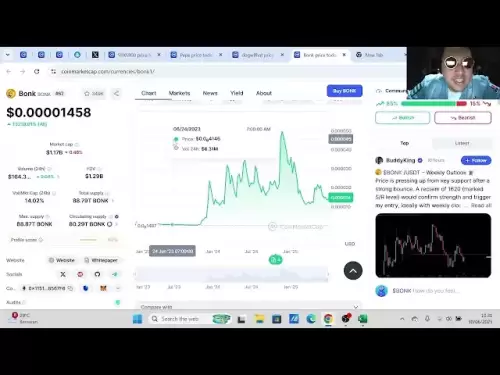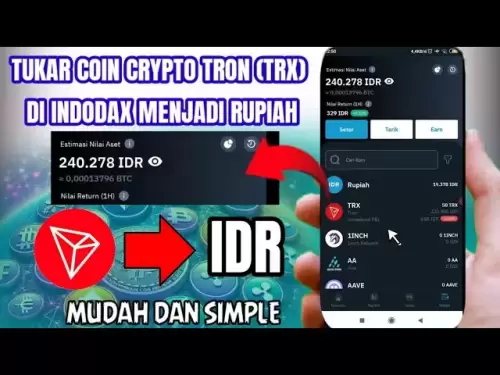-
 Bitcoin
Bitcoin $108,489.6704
1.13% -
 Ethereum
Ethereum $2,502.0528
2.92% -
 Tether USDt
Tether USDt $1.0002
0.00% -
 XRP
XRP $2.1941
0.51% -
 BNB
BNB $655.3375
1.00% -
 Solana
Solana $151.5977
1.27% -
 USDC
USDC $0.9999
0.00% -
 TRON
TRON $0.2768
0.32% -
 Dogecoin
Dogecoin $0.1676
2.86% -
 Cardano
Cardano $0.5675
0.98% -
 Hyperliquid
Hyperliquid $40.6109
7.48% -
 Bitcoin Cash
Bitcoin Cash $500.7746
2.09% -
 Sui
Sui $2.8328
2.03% -
 Chainlink
Chainlink $13.4452
1.26% -
 UNUS SED LEO
UNUS SED LEO $9.1623
0.39% -
 Avalanche
Avalanche $18.2267
2.24% -
 Stellar
Stellar $0.2382
0.00% -
 Toncoin
Toncoin $2.8885
1.68% -
 Shiba Inu
Shiba Inu $0.0...01159
0.91% -
 Litecoin
Litecoin $87.1827
0.88% -
 Hedera
Hedera $0.1511
2.90% -
 Monero
Monero $315.4992
-0.59% -
 Polkadot
Polkadot $3.4663
2.34% -
 Bitget Token
Bitget Token $4.6118
-0.65% -
 Dai
Dai $1.0000
-0.01% -
 Ethena USDe
Ethena USDe $1.0003
0.02% -
 Uniswap
Uniswap $7.2989
4.69% -
 Pepe
Pepe $0.0...01003
5.73% -
 Aave
Aave $275.5616
7.15% -
 Pi
Pi $0.5181
-2.49%
How to export MEXC's contract trading history?
Exporting your MEXC contract trading history is essential for analysis, taxes, and records. Follow our guide to efficiently retrieve your data in a CSV file.
Apr 04, 2025 at 07:49 am
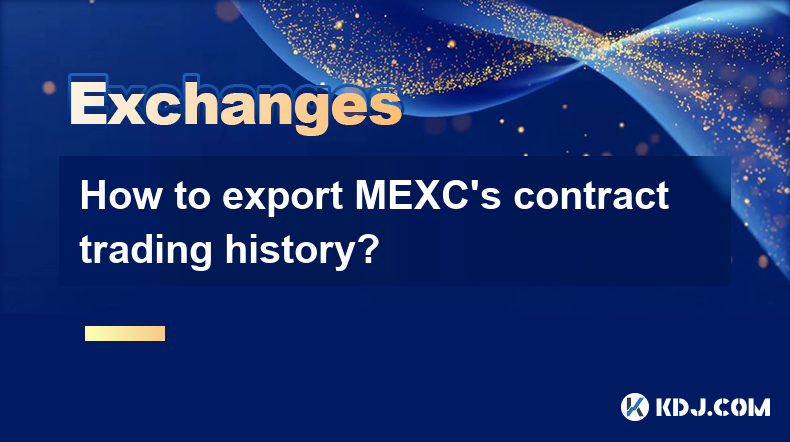
Exporting your contract trading history from MEXC is a crucial task for many traders who need to keep detailed records of their transactions for analysis, tax purposes, or personal record-keeping. This guide will walk you through the process step-by-step, ensuring you can retrieve your data efficiently and accurately.
Accessing Your MEXC Account
Before you can export your contract trading history, you need to log into your MEXC account. Here's how you do it:
- Open your preferred web browser and navigate to the MEXC website.
- Click on the "Log In" button located at the top right corner of the homepage.
- Enter your registered email address and password.
- If you have enabled two-factor authentication (2FA), enter the code sent to your mobile device or generated by your authenticator app.
- Once logged in, you will be directed to your MEXC dashboard.
Navigating to the Contract Trading Section
After logging in, you need to navigate to the contract trading section where your trading history is stored:
- From the MEXC dashboard, hover over the "Trade" menu at the top of the page.
- Select "Futures" from the dropdown menu to access the futures trading platform.
- On the futures trading page, click on the "Orders" tab located at the top of the trading interface.
- Within the "Orders" tab, select "Trade History" to view your past transactions.
Exporting Your Contract Trading History
Now that you are in the correct section, you can proceed to export your trading history:
- On the "Trade History" page, you will see a list of all your past trades.
- At the top right corner of the trade history table, you will find an "Export" button. Click on this button.
- A dialog box will appear, allowing you to select the time range for the data you want to export. Choose the desired start and end dates.
- After selecting the time range, click on the "Export" button within the dialog box.
- The system will process your request and generate a CSV file containing your trading history. This may take a few moments depending on the volume of data.
Downloading and Verifying the Exported File
Once the export process is complete, you need to download and verify the file:
- A download link will appear on the screen once the CSV file is ready. Click on this link to download the file to your computer.
- Open the downloaded CSV file using a spreadsheet program like Microsoft Excel or Google Sheets.
- Review the data to ensure that all your trades within the selected time range are included and that the information is accurate.
Using the Exported Data
After verifying the exported data, you can use it for various purposes:
- Analyze your trading performance by calculating metrics such as profit and loss, win rate, and average trade duration.
- Prepare for tax reporting by categorizing your trades and calculating your taxable gains or losses.
- Keep a personal record of your trading activities for future reference or to track your progress over time.
Troubleshooting Common Issues
Sometimes, you might encounter issues while exporting your trading history. Here are some common problems and their solutions:
- File not downloading: Ensure that your internet connection is stable. If the issue persists, try clearing your browser cache and cookies, then attempt the export again.
- Incomplete data: If the exported file does not contain all your trades, double-check the time range you selected. If the problem continues, contact MEXC customer support for assistance.
- File format issues: If the CSV file does not open correctly, try opening it with a different spreadsheet program or check if the file is corrupted by attempting to download it again.
Frequently Asked Questions
Q: Can I export my trading history for a specific cryptocurrency only?
A: Currently, MEXC's export feature does not allow you to filter by specific cryptocurrencies. You will need to export the entire trading history and then filter the data manually in your spreadsheet program.
Q: How often should I export my trading history?
A: It depends on your needs. For tax purposes, you might want to export your data at the end of each financial year. For performance analysis, you might choose to do it monthly or quarterly.
Q: Is there a limit to how much data I can export at once?
A: MEXC does not specify a limit on the amount of data you can export in one go. However, if you have a very large number of trades, it might take longer to process and download the file.
Q: Can I automate the export process?
A: As of now, MEXC does not offer an API or automated tool for exporting trading history. You will need to manually export the data each time you need it.
Disclaimer:info@kdj.com
The information provided is not trading advice. kdj.com does not assume any responsibility for any investments made based on the information provided in this article. Cryptocurrencies are highly volatile and it is highly recommended that you invest with caution after thorough research!
If you believe that the content used on this website infringes your copyright, please contact us immediately (info@kdj.com) and we will delete it promptly.
- Bitcoin's Bumpy Ride: Profit-Taking Slows Momentum, What's Next?
- 2025-06-30 20:30:11
- Bitcoin's Price Stall: Decoding the ETF Inflows Mystery
- 2025-06-30 20:30:11
- Ripple XRP, Bitcoin, and Solaris Presale: What's the Buzz?
- 2025-06-30 18:50:11
- SpaceX, Mirror Tokens, and Investors: A Wild Ride to the Future?
- 2025-06-30 19:10:22
- Arbitrum (ARB) and Robinhood: Partnership Rumors Fuel Price Surge to $0.4289?
- 2025-06-30 19:10:22
- Jasmy Coin, Bitcoin, and the Rise of Solaris Presale: What's the Buzz?
- 2025-06-30 18:30:12
Related knowledge
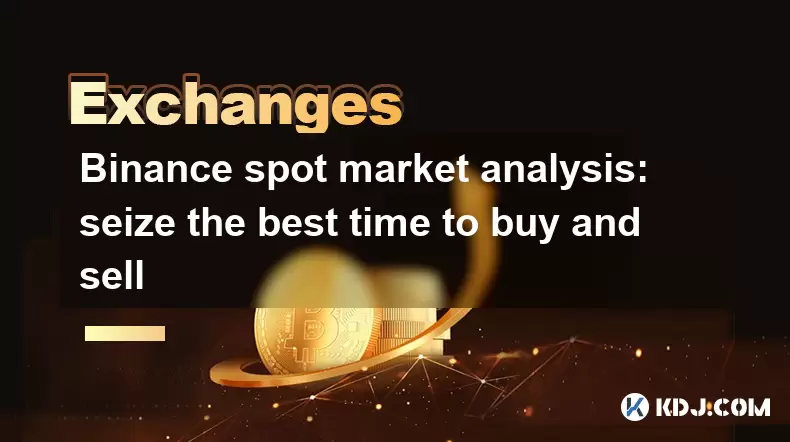
Binance spot market analysis: seize the best time to buy and sell
Jun 19,2025 at 04:56pm
Understanding the Binance Spot MarketThe Binance spot market is one of the most popular platforms for cryptocurrency trading globally. It allows users to trade digital assets at current market prices, making it essential for traders aiming to buy low and sell high. Unlike futures or margin trading, spot trading involves direct ownership of the asset aft...
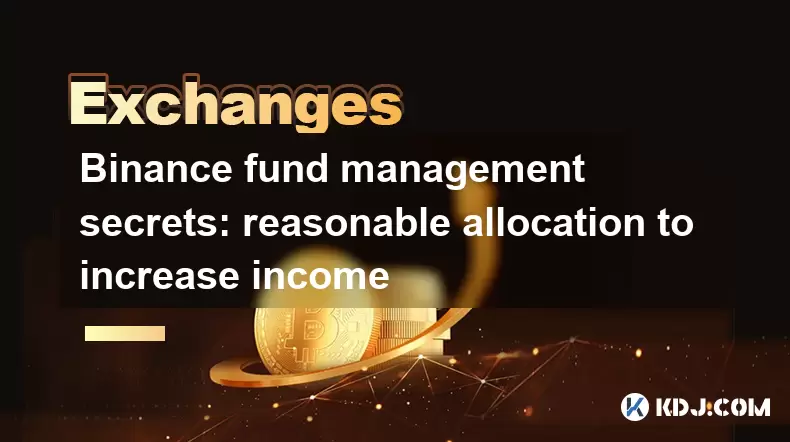
Binance fund management secrets: reasonable allocation to increase income
Jun 22,2025 at 02:29pm
Understanding Binance Fund ManagementBinance fund management involves strategic allocation of your cryptocurrency assets to optimize returns while managing risk. The key to successful fund management lies in understanding how different investment options on the Binance platform can be utilized to create a diversified portfolio. This includes spot tradin...
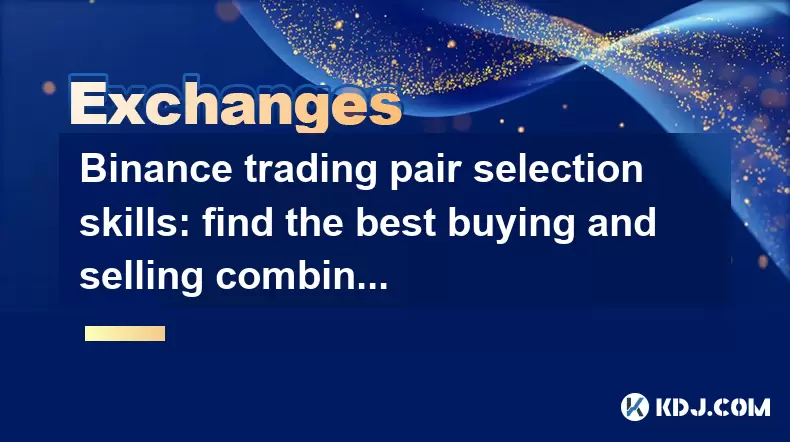
Binance trading pair selection skills: find the best buying and selling combination
Jun 23,2025 at 02:49am
Understanding the Basics of Trading Pairs on BinanceBefore diving into trading pair selection skills, it's essential to understand what a trading pair is. On Binance, a trading pair refers to two cryptocurrencies that can be traded against each other. For example, BTC/USDT means Bitcoin is being traded against Tether. Each trading pair has its own liqui...
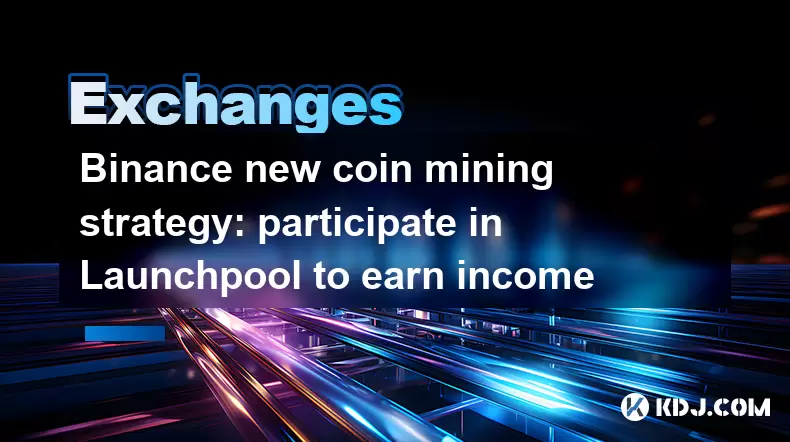
Binance new coin mining strategy: participate in Launchpool to earn income
Jun 23,2025 at 11:56am
What is Binance Launchpool and how does it work?Binance Launchpool is a feature introduced by the world’s largest cryptocurrency exchange, Binance, to allow users to earn new tokens through staking. This platform enables users to stake their existing cryptocurrencies (such as BNB, BUSD, or other supported assets) in exchange for newly launched tokens. T...
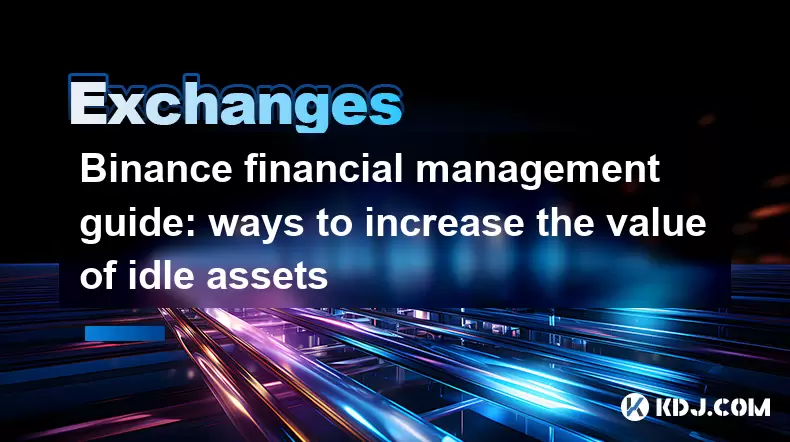
Binance financial management guide: ways to increase the value of idle assets
Jun 19,2025 at 11:22pm
Understanding Idle Assets in the Cryptocurrency SpaceIn the fast-paced world of cryptocurrency, idle assets refer to digital currencies that are not actively being used for trading, staking, or yield farming. Holding these funds in a wallet without utilizing them means missing out on potential growth opportunities. Binance, as one of the leading platfor...
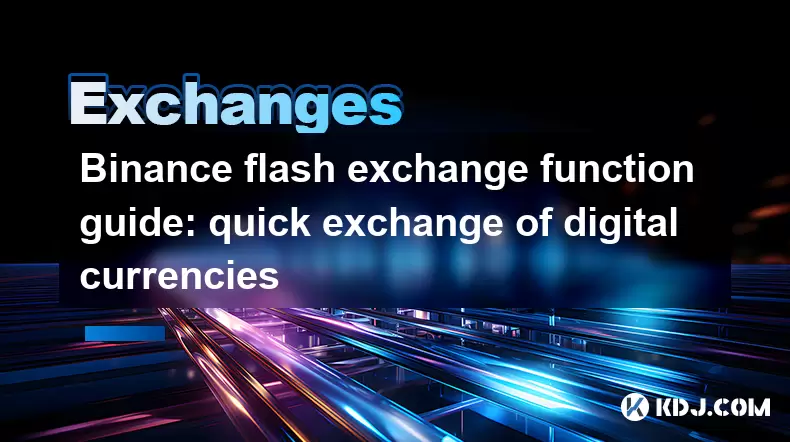
Binance flash exchange function guide: quick exchange of digital currencies
Jun 23,2025 at 12:29pm
What is the Binance Flash Exchange Function?The Binance Flash Exchange function is a powerful tool designed to allow users to instantly swap between supported cryptocurrencies without the need for placing traditional buy/sell orders. This feature simplifies the trading process by offering a direct exchange mechanism, eliminating the requirement to conve...

Binance spot market analysis: seize the best time to buy and sell
Jun 19,2025 at 04:56pm
Understanding the Binance Spot MarketThe Binance spot market is one of the most popular platforms for cryptocurrency trading globally. It allows users to trade digital assets at current market prices, making it essential for traders aiming to buy low and sell high. Unlike futures or margin trading, spot trading involves direct ownership of the asset aft...

Binance fund management secrets: reasonable allocation to increase income
Jun 22,2025 at 02:29pm
Understanding Binance Fund ManagementBinance fund management involves strategic allocation of your cryptocurrency assets to optimize returns while managing risk. The key to successful fund management lies in understanding how different investment options on the Binance platform can be utilized to create a diversified portfolio. This includes spot tradin...

Binance trading pair selection skills: find the best buying and selling combination
Jun 23,2025 at 02:49am
Understanding the Basics of Trading Pairs on BinanceBefore diving into trading pair selection skills, it's essential to understand what a trading pair is. On Binance, a trading pair refers to two cryptocurrencies that can be traded against each other. For example, BTC/USDT means Bitcoin is being traded against Tether. Each trading pair has its own liqui...

Binance new coin mining strategy: participate in Launchpool to earn income
Jun 23,2025 at 11:56am
What is Binance Launchpool and how does it work?Binance Launchpool is a feature introduced by the world’s largest cryptocurrency exchange, Binance, to allow users to earn new tokens through staking. This platform enables users to stake their existing cryptocurrencies (such as BNB, BUSD, or other supported assets) in exchange for newly launched tokens. T...

Binance financial management guide: ways to increase the value of idle assets
Jun 19,2025 at 11:22pm
Understanding Idle Assets in the Cryptocurrency SpaceIn the fast-paced world of cryptocurrency, idle assets refer to digital currencies that are not actively being used for trading, staking, or yield farming. Holding these funds in a wallet without utilizing them means missing out on potential growth opportunities. Binance, as one of the leading platfor...

Binance flash exchange function guide: quick exchange of digital currencies
Jun 23,2025 at 12:29pm
What is the Binance Flash Exchange Function?The Binance Flash Exchange function is a powerful tool designed to allow users to instantly swap between supported cryptocurrencies without the need for placing traditional buy/sell orders. This feature simplifies the trading process by offering a direct exchange mechanism, eliminating the requirement to conve...
See all articles























